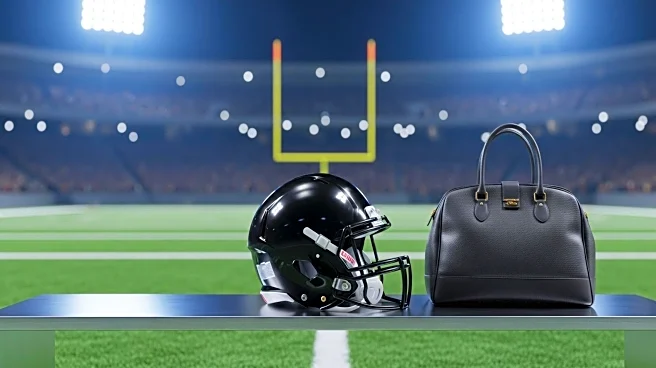What's Happening?
Jordon Hudson, the girlfriend of Bill Belichick, has been a notable presence at North Carolina's college football games, including their recent match against UCF. Hudson, who has attended all of North Carolina's games this season, was seen on the field speaking with Belichick during pregame warmups. Her presence has been a point of interest, especially after she was spotted wearing a Taylor Swift sweatshirt during a previous game against Richmond, which North Carolina won 41-6. Despite the attention, Hudson has reportedly been trying to stay out of the spotlight, focusing on her personal relationship with Belichick and handling some of his personal business connections.
Why It's Important?
The attention surrounding Jordon Hudson highlights the intersection of sports and celebrity culture, drawing public interest beyond the game itself. Her presence at the games, alongside notable figures like Randy Moss, Michael Jordan, and Lawrence Taylor, adds a layer of celebrity intrigue to North Carolina's football season. This attention can impact the team's media coverage and public perception, potentially influencing fan engagement and attendance. Additionally, Hudson's efforts to maintain a low profile suggest a conscious attempt to manage public and media scrutiny, which is a common challenge for individuals associated with high-profile figures.
What's Next?
As North Carolina continues its football season, it remains to be seen how Hudson's presence will influence media coverage and public interest. The team will return to Chapel Hill for their next games, and Hudson's attendance may continue to draw attention. The dynamics of her relationship with Belichick and her role in his personal and professional life could also evolve, potentially affecting how she is perceived by the public and media.
Beyond the Headlines
The situation underscores the broader cultural phenomenon of 'WAGs' (wives and girlfriends of sports figures) and their impact on sports narratives. Hudson's case illustrates how personal relationships of sports figures can become public spectacles, influencing both media coverage and public interest. This dynamic raises questions about privacy, media ethics, and the role of celebrity culture in sports.









